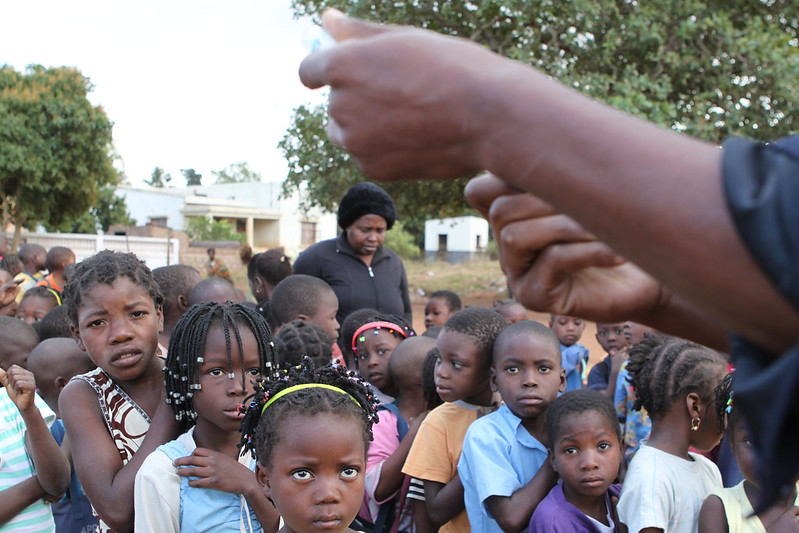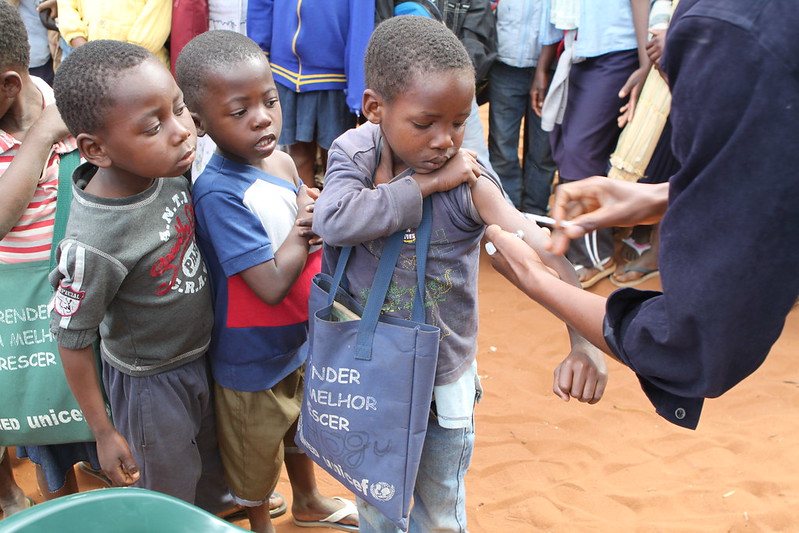
Chibuto, Gaza province, Mozambique
August 2012
Is 7-year-old Antonia afraid of what is going to happen? “No,” she replies confidently. She takes another look at the syringe, and adds a quiet, “a little.” The long line of children is a potpourri of feelings: curiosity, fear and courage accompanied by supportive shouts and some smiles. Little arms are held up, as the children prepare for their tetanus vaccine.
Cesar Pascoal Macitela is a health technician from the local hospital, and comes weekly to EPC 25 de Junho School in Chibuto district, Gaza province. “I like coming here to work with the children, they are sometimes afraid, sometimes happy, sometimes funny; you never really know in advance.” All the children look straight at the syringe when receiving the vaccine; today, curiosity trumps fear.
There is a young boy in line who looks very afraid, and when it is his turn to step forward, he refuses. The children behind him start pushing, but the boy has frozen and is close to tears. Mr. Macitela pretends not to take notice, and moves on to vaccinate the children behind him. “No, no, it’s okay, just let him wait, I will take him last,” he quietly tells the teacher trying to push the boy forward. “If he starts crying now we will have a real problem.” Mr. Macitela has done this for many years, and has learned that if one child starts crying, all of them might follow.
Dr. Yolanda Tedosio Mandlate accompanies Mr. Macitela to the school, to check on health standards. “We come weekly, to teach the children about oral health and personal hygiene. We vaccinate, make sure that the children wash their hands and evaluate the general standard of the surroundings. I just checked the sanitation facilities today, they are clean and there is running water.”
Last year, teachers at the school were trained in basic school health as a part of the Child-Friendly Schools initiative’s health programme. Leonora Jose Jovo, a Grade 4 teacher, took part in the training. “I learned how to identify the most common diseases and how to prevent and handle them. Now, I always remind my students about mosquito nets, about brushing their teeth and about washing their hands. Most importantly, I know when I have to send them to the hospital for professional attention,” she says.
Dr. Mandlate recalls, “Yes, we taught them a lot of things. One aspect that I think was very important, and new for many teachers, was how to identify mental health problems and make sure that children receive professional support. Children need understanding in order to solve their problems, and mental health issues are not a widely recognized condition here.”
Mr. Macitela continues, highlighting the importance of vaccines: “It is very important that they receive this protection in order to grow up and remain healthy.”
In November 2010, Mozambique proudly joined the group of countries that have eliminated maternal and neonatal tetanus. EPC 25 de Junho’s children are now also protected against the deadly disease, and need only two more injections in the coming months to complete the dose.
Published in the UNICEF Publication: Child-Friendly Schools – Stories from Mozambique & on the UNICEF Mozambique website
Photos & Text © UNICEF Mozambique/2012/Caroline Bach

You might have missed that it’s the “Vaccination Week in the Americas” (VWA) right now. During the week of 20-27th of April, the aim is for the countries in the region to strengthen their national immunization programs and reach out to populations with little or no access to regular health services. (So generally same thing we did in Mozambique during the “National Health Week” last year, see these photos!) This is the eleventh year that VWA is celebrated, and according to the Pan American Health Organization and the WHO, more than 410 million individuals of all ages have been vaccinated during the campaign since it started. With this year’s efforts, and the slogan “Vaccination: a shared responsibility”, the initiative seeks to immunize 44 million people in 44 countries and territories against many different diseases.

Immunization initiative, Chibuto, Gaza district. Mozambique 2012
I often realize how much I enjoy and miss going to the field. The field missions I did to collect material for the Child-Friendly Schools booklet were all about talking to people and photographing, such a perfect set up! In the video above, the kids are standing in line for the vaccination, singing “Puxa mazambana puxa!” It was some kind of popular children’s song at that time that I also was forced to dance to on live TV when participating in a children’s programme. On a Sunday morning after a night of dancing. Just because somebody had invited me and thought I should participate and I had said “Sure!” One of many random and beautiful things that happened in 2012.
Wow, it’s almost May – I need to get this year started!
After the deadlines.

National Health Week in Mozambique, November 2012